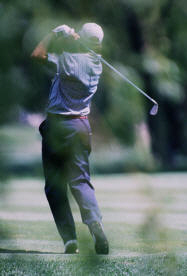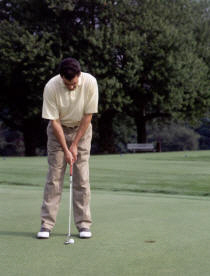Many golfers take the playing tips they read about in
magazines--or receive from well-meaning fellow players--too
seriously. Everyone should be cautious before trying to
make a drastic change in your normal game. With Richard's
videos, you can see the proper techniques in motion and
that is a great help.
Almost all golfers are guilty of doing too much thinking
about their golf swings while they're in the middle of a
round. The time to think and experiment is on the driving
range, not on the golf course.
When you're playing a serious round of golf, make sure you
have a good grip and setup and then let it happen. Don't
allow yourself to have more than one swing thought on the
same shot.
On bad-weather days, always make a realistic adjustment in
your scoring expectations. If the wind is blowing 30 mph,
add some strokes to the score you hope to shoot. Bad
weather affects all golfers; just remember that your
opponents are playing in the same conditions.
Before a round that's important to you, write down an exact
warm-up schedule. The evening before your game--when you
are relaxed--is a good time to do this. Make it sensible
and adhere strictly to your timetable. For most golfers a
40 minute warm-up is plenty. Make sure you don't hit too
many full shots and tire yourself before you even tee it
up. If you have a 10:00 a.m. tee time, your warm-up
routine should be listed something like this:
* 9:10-9:30 a.m.--Work on pitches and chips and a
few sand shots.
* 9:30-9:40 a.m.--Warm up your
putter with some brief, intense concentration. A short
session is better than having extended putting practice
before an important round. Ten minutes is sufficient.
* 9:40-9:55 a.m.--Hit four shots with a nine iron, four
with a seven iron, and four with a five iron. Then hit
three full shots off the grass with a metal three, and
three or four drivers from a tee. It's important to hit
the full shots last in your warm-up routine because you
want to be in a groove when you move to the first tee.
* 9:55 a.m.--Move leisurely to the first tee, you're
confident and ready.
When you go to the course, take your written schedule with
you. And keep your watch handy so you can be certain that
you're right on schedule during your warm-up routine. It's
important to avoid a feeling of being hurried or anxious.
Another tip in conjunction with your warm-up shots: Always
have a small, wet towel on your bag so you can quickly
clean the clubs you've been practicing with.
Not planning your warm-up routine carefully can be the
precursor to a bad round. You'll find yourself in a
panicky rush without proper preparation.
Of course, this type planning isn't necessary before every
friendly round, but it's important for tournaments or games
when you want to play your best.
All of these seemingly minor details appear insignificant
by themselves, but each one can cause a break in your
concentration before or after you start an important round
of golf. If you prepare yourself properly, you're mentally
and physically on the way to the kind of round you want to
play.















































